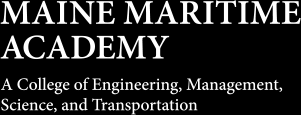Rescue & Research
My major was Marine Science, and having the opportunity to be on the water during college and learn more about boats was exactly the reason I came to MMA. I founded Marine Mammals of Maine (MMoME) in 2011, a non-profit organization dedicated to marine mammal and sea turtle response, rescue, care, research and education that covers the waters from Kittery to Rockland.
The combination of skills I acquired at MMA has helped me to be more diversified when working with other collaborators on marine mammals research projects. Not only can I do the hands-on animal sampling, for example, but I also know how to drive the boat.
With this work you always have to be both ready to go and up for almost anything. Animals don’t strand when it is convenient for us. Working with live and deceased marine mammals, sometimes scenarios can be unpredictable. We deal with many situations, both on land and at sea.
NOAA declared an Unusual Mortality Event (UME) for a few large whale species that are on the east coast within the last few years. This includes Minke, Humpback and Right whales. Part of our role at Marine Mammals of Maine is to further investigate these mortalities.

Lynda Doughty ’08 caring for seal.
This past summer a deceased whale about three miles offshore from Old Orchard was reported to our hotline. We received photos and determined it was a recently deceased Minke whale, so we set about to recover the animal for necropsy and testing since its tissues were still in viable condition for sampling.
We took a small barge out of Portland to its last known coordinates. The marine forecast was in our favor. Our goal was to document the carcass and tow it to a set landing location. From there we put the animal on a flatbed and trucked it to a designated compost site for necropsy.
As we approached, we noticed white sharks feeding on the animal. I didn’t want to interrupt the sharks’ meal, but I needed to get the whale for necropsy, which involved placing a tow rope by hand around its tail.
Leaning out the side door onto the whale as white sharks were lingering around was a bit unnerving. This wasn’t the time to accidentally fall in.
It is was a little tricky, but the tow rope placement was made, and we started the long tow in. As we approached shore, we received many odd looks as we neared heavier boat traffic areas.
This past year has been a challenge with the phocine distemper virus (PDV) that reared itself through the seal population. Our team responded to four times the amount of distressed and injured marine mammals than normal years.
I would love to think my work makes a difference in understanding more about marine mammals.█
—By Lynda Doughty ’08, Executive Director, Marine Mammals of Maine
Photos: Courtesy of Lynda Doughty




Post Comment
Comments are moderated and will be reviewed prior to posting online. Please be aware that when you submit a comment, you agree to the following rules:
Maine Maritime Academy reserves the right to delete any comment that does not comply with these guidelines and is not responsible or liable in any way for comments posted by its users. If you have a message for the editor, please email mariner@mma.edu.
Class Notes
View All >Read More